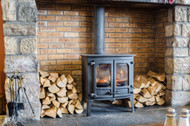Using Stove Pipe Sealant for Wood Stoves
Sep 5th 2024
In the bitter cold of winter, few things can compare to the life-giving heat of a hot wood stove. Food cooked over fire also has a flavor and quality that you simply can't create using electric heat. It’s also always there when the power goes out.
People love their wood-burning stoves, and if you install and/or replace stove pipes, you want to do the job right.
But, should wood stove pipes be sealed? If so, how? What is the best silicone to use as wood stove sealant?
Should You Seal Wood Stove Pipes?
It's not necessary to seal wood stove pipes, but there are good reasons to do so.
Wood stove piping is sold in lengths of metal. It's either prefabricated into pipes and welded at the seams or comes as flat sheets with snapping edges that you roll into pipes yourself.
One end of the pipe has vertical ripples, or crimping, with a flared-out hump that makes a ring around the pipe. This is the "male" end of the pipe. The other, uncrimped end of the pipe is the female end.
The pipes are connected by sliding the female end of one pipe over the crimped male end of the next section. Slide it all the way to the bulged metal until it stops. Then, fasten the pipes in place with a few self-tapping metal screws.
The overlapping metal and tight seams, combined with the draw of the stove pipe, make smoke leaks inside a building relatively rare. That said, smoke and carbon monoxide leaks can occur, and what's inside the pipe isn't the only thing you may want to seal off.
When you're trying to decide if you should grab a tube of sealant or not, consider these factors:
Rain and Weather
Wood stove pipes carry smoke and fumes from the fire outside. This means the pipe must go through the walls or roof of the building. You'll need to cut out a hole for the pipe to pass through, creating a vulnerable spot where water and icy-cold air can get in.
This is uncomfortable at best and can cause water damage, extremely rusted stove pipes, mold, expensive repairs, or medical problems at worst. It’s a good idea to use a good-quality RTV silicone sealant to seal the space between the stove pipe and the wall or roof it's passing through.
Our Pro Grade RTV Silicone Sealant is excellent for this task. It tolerates extreme temperatures, cures completely waterproof, and bonds to many different surfaces, including wood and metal. It's also flexible enough that you don't have to worry about the seal peeling away or breaking in winter winds or summer storms.
Smoke and Fume Leaks
Under certain conditions, even the most carefully installed wood stove occasionally blows smoke back inside a building. It's not a big problem for most people, but some folks don't like it. In extreme cases, enough smoke and carbon monoxide could become unsafe. Sealing the lengths of stove pipes together as you connect them can help prevent a leaky flue and any hazards that come with it.
Another good way stove pipe sealant can help is by preventing air from leaking into the pipe. Leaks will cause a weak draw in the heater, so the fire will not burn as strong or as hot. Instead, it's more likely to smolder and sputter, seriously undercutting the heater's ability to burn well.
Now, wood stoves burn hot – typically burning around 300-600°F. To stand up to this extreme heat, It’s best to use a high temp stove pipe sealant like our Hi-Temp Red and Blue 100% RTV Silicone Sealant and Gasket Maker. This product makes an excellent wood stove pipe sealant because it stands up to 550°F continuous heat and 650°F intermittent heat.
Because the heat will be most intense at the stove itself, you may want to avoid putting sealant on the heater-pipe connection. Instead, only seal the seams between pieces of stove pipe by squeezing a good bead of silicone around the male end of the pipe before joining the two pieces with screws. Also, pay special attention to any elbows or large gaps.
Silicone Depot has the Stove Pipe Sealant You Need
It's safer and better for the wood stove to protect the pipes from the elements and seal up any leaks. Get the best silicone stove pipe sealant from Silicone Depot for seals that will protect stove pipes and the homes around them for years to come.

